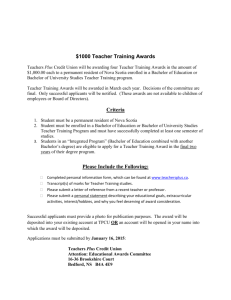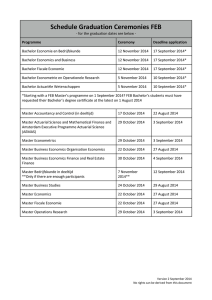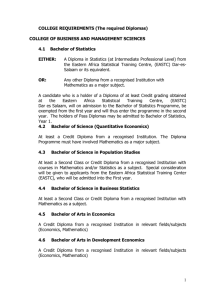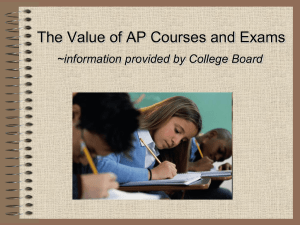Public Safety/Criminal Justice Cluster Overview
advertisement
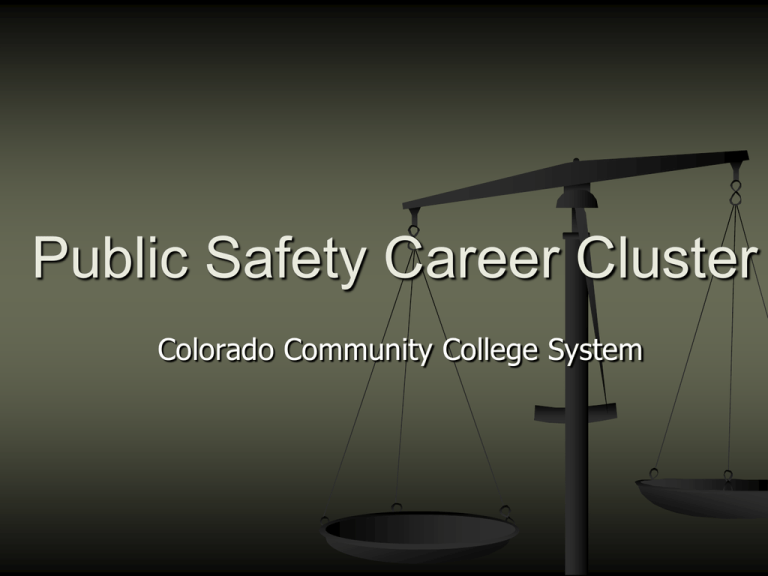
Public Safety Career Cluster Colorado Community College System Public Safety Pathways Planning, managing, and providing legal, public safety, protective services and homeland security, including professional and technical support service The Public Safety cluster is divided into 5 career pathways Correction Services Emergency and Fire Management Services Security and Protective Services Law Enforcement Services Legal Services Corrections Services Responsible for guarding people who have been arrested or convicted of a crime-their primary mission is to protect the public Correctional Officer -- $39,020 Probation Officer -- $47,200 Bachelor’s Degree Social Workers -- $42,480 High School Diploma or Equivalent Bachelor’s Degree Criminal Justice Teachers -- $58,040 Bachelor’s Degree to Doctoral Degree Emergency & Fire Management Services Responsible for putting out fires, treating injuries, and performing other vital functions-firefighters and emergency service workers help protect the public Firefighter -- $42,250 Emergency Management Director -- $59,770 Bachelor’s Degree EMT and Paramedic -- $40,360 Postsecondary Non-degree Award Postsecondary Non-degree Award + EMT/Paramedic License Hazardous Materials Remover -- $37,600 High School Diploma Law Enforcement Services Duties include controlling traffic, investigating crimes, maintaining order, enforcing laws, issuing tickets, and investigation of accidents Police Patrol Officer -- $55,270 Forensic Science Technician -- $51,570 Associate’s Degree to Bachelor’s Degree Transportation Security Screener -- $32,970 Bachelor’s Degree Bailiff -- $36,840 Associate’s Degree to Bachelor’s Degree High School Diploma Detective & Criminal Investigator -- $74,300 Associate’s Degree to Bachelor’s Degree Legal Services People working in this field hold positions of great responsibility and are obligated to follow a strict code of ethics Lawyer -- $112,760 Court Reporters -- $47,700 Law Degree Mediator -- $91,800 Postsecondary Non-degree Award Judge -- $91,800 Doctoral or Professional Degree Master’s Degree in Public Policy or a Law Degree Paralegal/Legal Assistant -- $46,680 Associate’s Degree Security and Protective Services Employees in this field often work in public buildings, factories, warehouses, government buildings, and military bases-they protect products, computers, machines, laboratories, and/or people Security Guard -- $23,970 Loss Prevention Manager -- $42,870 High School Diploma Private Detective/Investigator -- $42,870 High School Diploma Postsecondary Non-degree Award Animal Control -- $31,680 Postsecondary Non-degree Award Knowledge Law and Government Public Safety and Security Knowledge of laws, legal codes, court procedures, precedents, government regulations, executive orders, agency rules, and the democratic political process. Knowledge of relevant equipment, policies, procedures, and strategies to promote effective local, state, or national security operations for the protection of people, data, property, and institutions. English Language Knowledge of the structure and content of the English language including the meaning and spelling of words, rules of composition, and grammar. Knowledge Continued Administration and Management Psychology Knowledge of business and management principles involved in strategic planning, resource allocation, human resources modeling, leadership technique, production methods, and coordination of people and resources. Knowledge of human behavior and performance; individual differences in ability, personality, and interests; learning and motivation; psychological research methods; and the assessment and treatment of behavioral and affective disorders. Customer and Personal Service Knowledge of principles and processes for providing customer and personal services. This includes customer needs assessment, meeting quality standards for services, and evaluation of customer satisfaction. Knowledge Continued Personnel and Human Resources Education and Training Knowledge of principles and procedures for personnel recruitment, selection, training, compensation and benefits, labor relations and negotiation, and personnel information systems. Knowledge of principles and methods for curriculum and training design, teaching and instruction for individuals and groups, and the measurement of training effects. Sociology and Anthropology — Knowledge of group behavior and dynamics, societal trends and influences, human migrations, ethnicity, cultures and their history and origins. Computers and Electronics Knowledge of circuit boards, processors, chips, electronic equipment, and computer hardware and software, including applications and programming. Student Organizations HOSA – Future Health Professionals This organization is for students interested in pursuing careers in the health field. These fields would include Emergency Management Services (EMS, EMT, Fire Science) and Medical Forensics. SkillsUSA This organization is for students interested in pursuing careers in the law enforcement field. These fields would include police, criminal justice, crime scene investigations, etc. Skills Active Listening Speaking Talking to others to convey information effectively. Coordination Giving full attention to what other people are saying, taking time to understand the points being made, asking questions as appropriate, and not interrupting at inappropriate times. Adjusting actions in relation to others' actions. Critical Thinking Using logic and reasoning to identify the strengths and weaknesses of alternative solutions, conclusions or approaches to problems. Skills Continued Management of Personnel Resources Monitoring Motivating, developing, and directing people as they work, identifying the best people for the job. Monitoring/Assessing performance of yourself, other individuals, or organizations to make improvements or take corrective action. Reading Comprehension Understanding written sentences and paragraphs in work related documents. Skills Continued Time Management Judgment and Decision Making Managing one's own time and the time of others. Considering the relative costs and benefits of potential actions to choose the most appropriate one. Learning Strategies Selecting and using training/instructional methods and procedures appropriate for the situation when learning or teaching new things. Is Law, Public Safety, Corrections & Security the Right Cluster for You? 1. Do you do well in English courses? 2. Do you have a clean police record? 3. Do you enjoy meeting and interacting with strangers? 4. Do you keep your cool in stressful or dangerous situations? 5. Do you watch shows such as CSI and Law and Order? 6. Do you believe that public service is rewarding? 7. Are you more comfortable being outdoors than being inside? 8. Do you enjoy using technology such as computers? 9. Are you good at taking orders, obeying rules, and following instructions? 10. Are you interested in homeland security? If you answered “yes” to 5 or more questions this might be the right career cluster for you!


